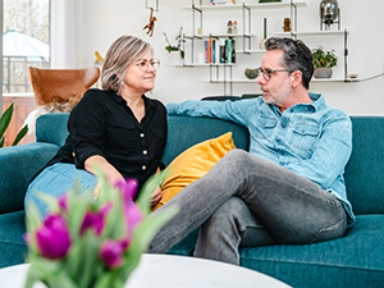Taming Diabetes: A Daily Challenge for Martin and His Family
Follow 8-year-old Martin and his family as they navigate daily life with type 1 diabetes, from meal adaptations to school activities, showing resilience and optimism.

"We organize ourselves," explain Claire and Olivier, the pragmatic parents of Martin, 8 years old, diagnosed with type 1 diabetes at the age of 5. For this Belgian family from Soignies, adaptation has now become routine.
"You can eat and do everything, but not anytime," Claire often repeats to her son. At just 5 years old, Martin received a type 1 diabetes diagnosis that disrupted his family's daily life. Now 8 years old, he grows up surrounded by his parents, Claire and Olivier, and his older sister, in a house full of laughter, warmth, and resilience in Soignies, Belgium. "This was before the diagnosis announcement," Claire explains right away, pointing to a family photo in a frame in the hallway. "You see how he was thinner? And then here, it's just after during a trip to Rome following the announcement. And here, with his father, in the middle of the carnival with the Gilles of Morlanwelz."
His Mother's First Suspicions
It was Claire, a health education teacher, who quickly noticed the first symptoms in her son: weight loss, pale complexion, intense thirst, unexplained fatigue, nocturnal enuresis... "He drank up to a liter of water before sleeping!" his father details. "With my experience in awareness, I immediately thought of diabetes," she confides. A few days later, a blood test followed by emergency hospitalization in intensive care confirmed the illness affecting Martin.
"Despite my suspicions, the diagnosis was a shock," admits Claire, who went through a phase of denial. "For his sister, it was difficult to understand that this diagnosis was forever." Olivier, the father, remembers the difficult beginnings. "We thought everything would change, that nothing would be the same as before. But in fact, we adapt. What seemed insurmountable at first is no longer at all today. Now, we 'know'!" he smiles. And Claire adds: "It's a taming."
Without a family history of diabetes, doctors considered a possible emotional trigger, perhaps related to Martin's early life, born with clubfoot. "But we're not sure of the origin. We'll never know, I think," Claire continues. "We also did the screening test and we are not carriers. My dad lived with type 2 diabetes, but it's completely different..."
Eating Everything, but Not Anytime
Regardless, the family reorganized their daily life to manage the variations in blood glucose levels – the famous "hypers" and "hypos" – that rhythm Martin's life. He discovered his new daily life at the hospital. For a week, the medical team "taught" the little family. "It was a lot of information!" insists Olivier. After a few days, Martin returned home with a colorful stuffed hippopotamus, indicating the body areas to prioritize for insulin injections.
Meals are now adapted to his needs and his two daily injections: goodbye to white bread and juices, hello to al dente pasta for everyone. But these adjustments do not prevent the family from enjoying happy moments. "We recently went to Plopsaland and ate pancakes, like everyone else," the mother recounts emotionally. "Last weekend we went to the cinema and of course, Martin also had popcorn! Well, during the movie it rang... he doesn't like that obviously. But we had the insulin pen with us and discreetly, we gave him a little injection. On the other hand, we'll choose the 2 PM session so it will be assimilated to the snack."

"The King of Diabetes"

"He is allowed to eat King's cake or a piece of Christmas log. We will just weigh exactly what he eats," Claire continues, before being interrupted by Martin who exclaims, very cheerfully, after discovering the lucky charm in his piece of cake: "And today, I am the king of diabetes!"
Despite the constraints related to the disease, Martin remains a child like any other. He loves playing with his superheroes, his electric train, and participating in local festivities. "Always with a candy or soda in his pocket, 'just in case'," his father explains. Birthday parties or special occasions just require particular vigilance. "Physical activities like trampoline can quickly trigger a hypo, so we always stay nearby. We know that effort or stress influences his glycemic levels. When he flies or returns to school after a vacation period, we see it directly on his blood glucose curve, for example."
The Challenge of Nights
What remains the most complicated to manage for the couple? Nights! "In case of hypoglycemia, we have to wake him up and give him food," Olivier explains. "The baby monitor has even reappeared, at an age when it shouldn't anymore," Claire adds. The parents also adapted their work schedules accordingly. "I work part-time and never start at 8:30 AM to avoid stressing him in the morning, to have time to give him his insulin injection," Claire continues. "Plus, we also have to add Martin's physiotherapy sessions for his feet to our schedules."
At school, a nurse came to explain the disease to his classmates. "At first, some children were afraid to play with him, thinking they could 'catch diabetes.' But now, everything is back to normal." While his mother is somewhat apprehensive about an upcoming 4-day, 4-night school trip, his father is more confident. "Martin will manage." "We just need to call to know all the menus," Claire adds, always pragmatic. "It's still difficult to entrust him to others. People are afraid and so am I. It took us so much time to tame the disease, so how can we explain in 10 minutes to someone how to regulate all this..." Nevertheless, Claire is delighted to see him participate in scout camps, where his sister is a leader, or camps organized with other children living with diabetes.
Healthy Habits for the Future
But the daily challenges related to the disease do not diminish Claire and Olivier's optimism. "Research is advancing. We hope that one day, there will be a simpler treatment, like a medication. Especially for children," Olivier declares. And Claire concludes philosophically: "Somehow, I think that learning to live with this disease from childhood allows him to integrate healthy habits that will serve him for his entire life! It's a strength he will carry with him."




